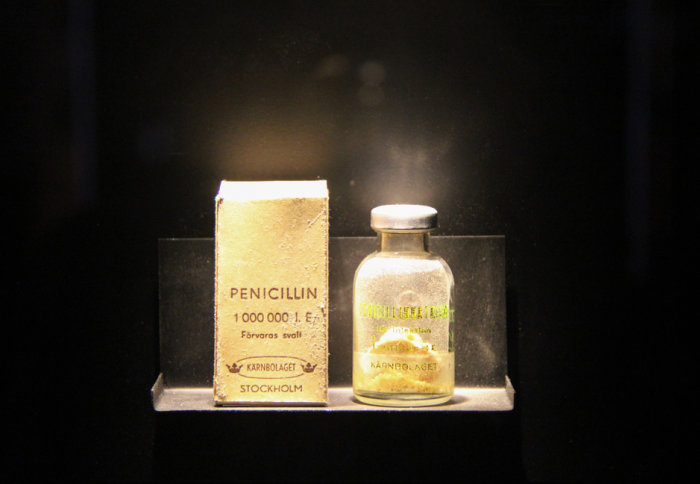Sir Alexander Fleming knew in 1936 bacteria would beat antibiotics
by Kate Wighton

One of the first bottles of penicillin
Dr Bill Frankland, acclaimed allergy expert and now 106 years old, recalls clearly when Sir Alexander Fleming foretold the demise of antibiotics.
As you can hear in this interview, Dr Frankland, who worked with Fleming at Imperial College London, remembers hearing Fleming’s dire warning as a medical student in 1936.
Not long before this, in 1928, Fleming had discovered the first ever antibiotic – penicillin – at St Mary’s Hospital, London.
Fleming said there would be a revolution, but doctors will overuse it, and because bacteria have to survive...they will become resistant to it Dr Bill Frankland
Dr Frankland, who was awarded an MBE for his services to allergy research, recalls: “It was [at a lecture] in 1936 that Fleming said ‘we have this new substance that I have designated penicillin, because it comes from a penicillin mould.. And when we are able to use it commercially, on humans, it will change the whole of medicine.'
“He said there would be a revolution, but doctors will overuse it, and because bacteria have to survive - they are very very clever - they will become resistant to it. I didn’t know what he was talking about at the time, it seemed all rather silly to me. But he had already realised this was going to happen”

And 86 years later, all of Fleming’s predictions have come true.
Antibiotics have transformed medicine, and saved countless lives by killing bacteria that could otherwise lead to deadly infection.
But their life-saving potential has led to overuse, and now bacteria are learning to overcome the medicines, making antibiotics less effective by the day.
This week marks the World Health Organisation Antibiotic Awareness Week, where medical leaders are calling for global initiatives to preserve antibiotics.
Imperial’s legacy of pioneering work continues, and our doctors and scientists are leading the fight against antibiotic resistance by developing strategies to keep the medicines working for longer, and creating new alternatives to the treatments.
Listen to Dr Frankland describing his work with Sir Alexander Fleming
'Marvellous man'
Dr Frankland, who was interviewed in March for the Imperial Podcast, worked with Fleming at Imperial College London between 1954-55. Fleming was by this point a global celebrity, having won the Nobel Prize in 1945, and part of Dr Frankland’s role as clinical assistant was to sift through the bundles of requests and mall he received.
He started getting pain in his chest and down his arm, but he didn’t accept he was having a heart attack Dr Bill Frankland
Dedicated to his work and “always looking down his microscope”, Fleming was still discussing his work with Dr Frankland just a few hours before his death from a heart attack.
“He started getting pain in his chest and down his arm, but he didn’t accept he was having a heart attack, despite his wife also trying to persuade him that possibly he could be having a heart attack.”
Dr Frankland remembers Fleming as “a marvellous man”, despite being a sometimes intimidating figure. “I remember my chief asking Fleming for a pay rise on my behalf. My chief said I had two children, am working very hard, and was only paid £550 a year. Fleming replied if he paid me more I’d only go and have more children. But he gave me the raise. And I went on to have more children.”
Article text (excluding photos or graphics) © Imperial College London.
Photos and graphics subject to third party copyright used with permission or © Imperial College London.
Reporter
Kate Wighton
Communications Division